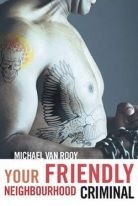Your Friendly Neighbourhood Criminal
“Now I’m gonna tell you a secret about the real world. Ready?...The citizens out there, they all want to make a million dollars and they are not honest because no one ever made a million dollars honestly.”
OK, so “Monty” Haaviko, the anti-hero of Michael Van Rooy’s Your Friendly Neighbourhood Criminal, is basically full of shit. But this passage nonetheless remains perhaps the key insight into what makes the title character tick. And it’s that kind of crystalline illustration of the criminal worldview that makes the novel such a fine example of its type.
This is, essentially, classic hard-boiled pulp fiction updated to a 21st century ‘Peg City.’ It’s not simply that there are stylistic echoes of Raymond Chandler and film noir, Van Rooy goes deeper than that, grasping what’s at the heart of the best noir fiction: the bitter recognition of the world as a mostly rotten place. It’s as narrator Monty at one point describes the music blasting from a crackhouse: “Songs about fucking and fighting and hurting and being hurt and truth and lies and rage, but nothing about love at all.”
The other bitter pill? There is but a tenuous thread separating the high from the low. This sentiment is expressed explicitly at one point when Monty theorizes why people can’t look the homeless in the eye. More cuttingly, it is illustrated by Van Rooy’s juxtaposition of disparate Winnipeg locations, such as when Monty has to make a sojourn into a crime-ridden neighbourhood near the University of Winnipeg. And wouldn’t you know that the landlords of a North End crackhouse have digs in River Heights. Like James “Demon Dog” Ellroy, Van Rooy reveals the skull beneath the skin of polite society.
I haven’t even begun to discuss the plot, but never mind, because plots aren’t really what you read this kind of book for (Chandler didn’t even care if his made sense). What you read it for is the sad poetry and the style. The characters in Your Friendly Neighbourhood Criminal are great banterers, and although their speech is also evocative of noir, Van Rooy is still able to make it feel like its uniquely their own. Indeed, I know people who talk like this, and I bet Van Rooy does too. I’m glad he decided to listen carefully when they talked.
The other thing you read this stuff for is the arcane knowledge. The novel is chock full with details of criminal technique and underworld lore, and it unfailingly fascinates and disturbs. Perhaps the most memorable detail, however, is an inventory run-down Monty gives of the kind of arsenal at police disposal. You’d think it’d make you feel more comfortable, but somehow it doesn’t.
And Monty makes for a beguiling protagonist. He’s flawed for sure, but so are the best characters in fiction. What’s important is that he’s likeable and still basically sympathetic; he’s a crook, but he’s not without his principles. Which makes him only slightly better than some of those he squares off against, but then, that is almost the whole point right there.
Published in Volume 63, Number 19 of The Uniter (February 5, 2009)







